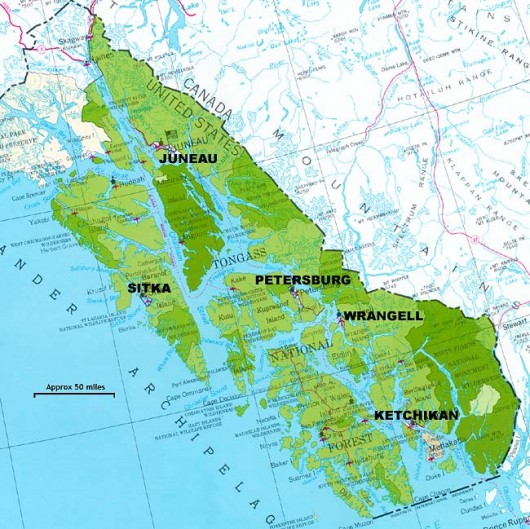The Ketchikan Gateway Borough Assembly approved a resolution Tuesday supporting a transfer of the 17 million-acre Tongass National Forest to state control.
Two people spoke during public comment in support of the resolution, which declares the borough’s support for the concept brought forward by Rep. Don Young in 1995 through his Tongass Transfer and Transition Act.
Trevor Shaw is a Ketchikan School Board member, but said he was speaking for himself, not as an elected official. He said the state and local government are negatively affected by federal overreach.
“I personally believe that our land and our state is best kept, and the best stewards are us, the residents of the great state of Alaska,” he said. “I think oftentimes, the EPA and other agencies of the federal government kind of overlook the importance of those natural resources to us as a state and as citizens.”
Lloyd Gossman told the Assembly that if there ever was a time to start transferring the Tongass out of federal control, that time is now.
“I’m so afraid like many people that our current administration, the president of the United States, is going to want to make a lot of Alaska part of his legacy,” he said. “I think his latest efforts up on the North Slope are just a start. He’s got two years left and before that time is up, we’re going to see a good hard run on the Tongass, and try and get it locked up for good.”
During Assembly discussion of the issue, the resolution’s sponsor, Glen Thompson, said that the federal government’s ownership of vast areas of land in the West means that those states are not able to tax adequately to support public services.
“There’s about 3 million acres within the borough that belong in the Tongass National Forest. That represents about 98 percent of the land,” he said. “So, what we have is the largest landholder in the borough is nontaxable.”
Thompson said the borough and other communities throughout the region have relied on federal payments in lieu of taxes, timber receipts and other programs to make up for the lack of a tax base, but those programs have eroded or disappeared over the years.
The resolution passed 6 to 1 with Assembly Member Bill Rotecki casting the only no vote. Rotecki didn’t comment on the resolution before voting.
While not on the agenda, pot was a topic of discussion. David Hangar spoke during public comment, and strongly advocated allowing retail marijuana businesses to operate in Ketchikan.
“Within a handful of days, marijuana is going to be legal in the State of Alaska,” he said. “What this borough needs to be thinking about most sincerely is: Turn it loose and tax it.”
Alaska voters approved an initiative last fall legalizing marijuana in the state. It becomes legal for personal consumption on Feb. 24, but won’t be legal to sell until the state comes up with a set of rules. Individual communities can opt out of commercial sales, and the local government is considering whether to allow retail pot operations.
Mayor Landis noted that there is information about the marijuana legalization process posted online on the borough planning department’s page, including links to proposed legislation and a report from Planning Director Chris French, who attended a recent marijuana conference in Colorado. http://www.borough.ketchikan.ak.us/774/Marijuana-Legalization
Also Tuesday, the Assembly agreed to let Mayor David Landis write letters to the governor and Ketchikan’s legislative representatives regarding a state finance report that recommends reconsidering Ketchikan and Juneau’s share of the state cruise ship head tax funds.







